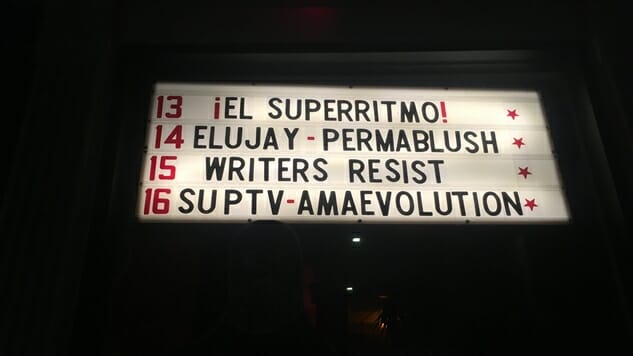Writers Around the World Come Together to Resist Trump
Photo by Mike Wardynski Media Features Writers Resist
In a packed upstairs ballroom of Oakland’s Starline Social Club, poet Solmaz Sharif introduced herself to the audience by saying, “Violence against bodies is pre-meditated in a violence against language.” She then read the title poem of her debut collection LOOK, which was a finalist for the National Book Award. The poem opens with the line: “It matters what you call a thing.”

Mike Wardynski, creator of A Sign of the Times photography project with the aim of getting people involved in the age of Trump, provided the above photo of Solmaz Sharif to Paste.
Sharif was the final reader for Bay Area Writers Resist (BAWR)—an event that took place this past Sunday, on Rev. Martin Luther King Jr.’s birthday, in conjunction with over 100 others across the country and beyond. Earlier in the evening, writer D.A. Powell opened a prose piece with a similar sentiment, saying, “Words matter deeply. They are what binds us and what sets us free.”
Such seemingly simple lines slice to the heart of the Writers Resist network which was founded by poet Erin Belieu, and built on the idea that language is not just powerful, but a cornerstone of democracy. (The movement is in fact being renamed Write Our Democracy, according to its website.) “Our country was founded on brilliant writing,” the site reads. While Donald Trump’s election signifies “growing public cynicism and the alarming disdain for truthfulness,” the right words—used in the right way—could serve as an antidote.
The flagship Writers Resist event took place on the steps of the New York Public Library, while other local events could be found everywhere, ranging from the UK, Singapore, a brewery in Alabama, a burger bar in Virginia, a university in Rhode Island to a theatre in Portland.
“A crucial piece of the national vision is that each localized response have its own focus and character,” BAWR organizer Heather June Gibbons explained. In Oakland specifically, the line-up was composed of 15 fierce poets and writers, largely sharing their own work.
“All of us organizers for BAWR felt strongly that in addition to sharing a commitment to social justice, it was crucial that the reader line-up be truly diverse—in terms of race, ethnicity, class, age, gender identity, and sexual orientation,” Gibbons said, “but also in terms of style and tone. The Bay Area is such a rich and vast literary landscape made up of so many different, vibrant literary communities, many of which overlap, and we wanted to provide a space for as many as possible to come together.”
That diversity appeared to pay off. Oakland’s event was packed to capacity, drawing an audience of 500 people, with another 100 or so attendees turned away. The performers used their words and craft to rally the audience and decry xenophobia, homophobia, misogyny, racism, anti-intellectualism, colonialism, and more.
Tennessee Reed asked which immigrant families have caused more terror: Syrian families or the Bush family? Jane Hirschfield shared a poem about how daily moments of life are “utterly changed” once resistance is needed. Javier Zamora called for us to get our humanity back. Elena Rose called for action. “It is not the last hour or the last day,” she said following a powerful performance piece. “We have room to work. So let’s get to it.”

Photo of Elena Rose by Sean James Mikula
To that end, the Bay Area event also supported the Southern Poverty Law Center, Transgender Law Center, and the International Institute of the Bay Area through donations. (The event itself, in the spirit of democracy, was free.)
Sunday’s event series was just the beginning, too—a so-called “re-inauguration” of democracy. The Writers Resist website suggests education, workshops, and writing prompts will be a large part of its ongoing efforts. Gibbons, who will be transitioning into the leadership of Write our Democracy, said “Plans and strategies for various efforts are in the works, both locally and nationally—at this point, all I can say is that there is much more to come!”
So far, though, the organizers are pleased by the response. The 100 events that took place on Sunday doubled the movement’s original estimate. “The first goal was to make a strong statement on Jan. 15 for the protection and celebration of democracy and free speech, both locally and nationally,” Gibbons added. “Now that we have this network established, and this incredible momentum and energy, we will continue to resist attacks on equity, compassion, and free speech in days ahead.”
Alyssa Oursler is a freelance writer based in San Francisco. You can find her on Twitter at @alyssaoursler.